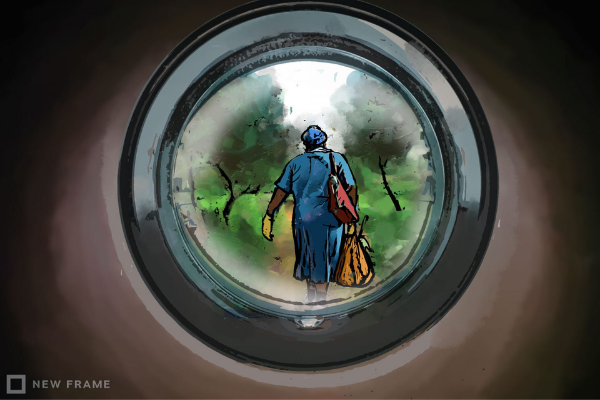As the coronavirus spreads across the world, social stratification and inequalities are laid bare.
The persistent inequalities created by global capitalism mean that some South Africans can work in the comfort of their homes while in lockdown and still get paid. But those in precarious employment circumstances face an uncertain future as they try to deal with Covid-19.
In South Africa, domestic workers have little or no job security and are often underpaid. They are at the receiving end of the coronavirus outbreak and its consequences, such as a country in lockdown. There are about one million domestic workers in South Africa, mostly black women.
In terms of the national minimum wage, domestic workers are paid R15.57 an hour. Despite labour laws demanding that employers give them written contracts and issue payslips, many domestic workers go without these and other key employment benefits.
The World Health Organization and many governments around the world have urged people to practise social distancing to manage the rate at which Covid-19 spreads. Taking a more drastic approach, President Cyril Ramaphosa announced a national lockdown of 21 days in terms of the National Disaster Act. It took effect at midnight on 26 March 2020.
According to the president and founder of United Domestic Workers of South Africa, Pinky Mashiane, the lockdown will mean poverty and hunger for domestic workers.
There are domestic workers that were given half pay and will only be paid once they have returned and worked. There are domestic workers that are paid in cash [for] a day. If she worked today, her employer gives her R150 or R200 and they can use that to buy bread for their children.
~ Pinky Mashiane, Founder of United Domestic Workers of South Africa (UDWOSA)
Florence Sekolane, 47, has been a domestic worker for more than 18 years. A member of the Izwi Domestic Workers Alliance, she echoed Mashiane’s sentiments, saying that some domestic workers “won’t have enough money to buy food and pay rent. Some employers will take the line of no work, no pay. The little that you have will run out.”
Contracting Covid-19 at work
Ramaphosa has announced some interim relief programmes to help people during the pandemic, such as the Solidarity Response Fund to support those whose lives have been disrupted. Covid-19 has also been declared an occupational disease, which means workers can claim from the Worker Compensation Fund if they can prove that they contracted it at work.
According to compensation commissioner Vuyo Mafata’s declaration, the employers of workers who contract the disease in the course of their employment will have to cover their medical aid and pay employees while they are recovering from the illness. However, the position of workers in non-standard employment was not addressed.
“He [Ramaphosa] did not mention domestic workers and other workers in precarious employment, like informal traders and farm workers,” said Mashiane. “He did not clarify our position as to which category we fall in. Even now, in WhatsApp groups, we are asking each other as to where we fit in the president’s grand plan.
“He spoke about workers who might have contracted the disease at their place of work being able to claim through the compensation fund. He knows very well that as domestic workers we went all the way to the Constitutional Court because we are not covered by the compensation fund. There is no way that we could go and claim from the compensation fund because we know that does not cover us.”
Thulani Nkosi, a senior attorney at the Socio-Economic Rights Institute (Seri), has been at the forefront of a legal challenge to compel the Department of Labour to amend the Compensation for Injuries and Occupational Diseases Act (Coida) to include domestic workers. The high court declared their exclusion unconstitutional in May 2019, but Nkosi says this does not mean they have reaped the benefits of this decision.
The current legal position is that until and unless the Constitutional Court confirms the constitutional invalidity of Coida, domestic workers remain vulnerable and excluded from claiming any protection from Coida for any occupational injury, including the coronavirus. Coida still says domestic workers working in private households are not employees for purposes of the protection given by Coida.
~ Thulani Nkosi, Senior attorney at SERI
Seri instituted its legal challenge on behalf of the daughter of a domestic worker, Maria Mahlangu, who fell into her employer’s swimming pool while working and drowned. Her daughter was told that the family could not claim from the compensation fund, as domestic workers and their dependents were excluded from Coida.
Nkosi says domestic workers can also not count on any laws to compel employers to allow them special leave to socially distance themselves.
Unfair treatment
“The nature of that job is such that a domestic worker is wholly reliant on humaneness and on the whims of the employer,” he said.
“Outside statutory entitlements like annual leave, there are no safeguards that domestic workers can rely on. If there is some annual leave due, then a particular worker may take time away from work in lieu of that leave. But the real issue here is that the current labour laws were not created with such situations in mind so they don’t make any provision for all employees in all workplaces.”
Mashiane told New Frame before the shutdown was announced that there were some domestic workers who had been prevented from going home for social distancing. “Five domestic workers called me today [15 March]. The fifth one said she wanted to go home, but the employer said if she goes home, she must go forever. They said she should stay and work until April, and told her she is not going anywhere.”
Another domestic worker had a slight cough “and they [her employer] said ‘just stop right there’. She was stopped from coming to the house. They got an Uber for her to take her to the taxi rank [to get home].”
Mashiane says she has received many calls from domestic workers expressing their concern and frustrations about Covid-19 and the impact it has had on their employment.
“[On 15 March] two called me. One said the employers sent their five-year-old child to tell her that she should not come to work anymore. The other one told me the same thing. They sent her home. They said she must go home because there is this virus and she was going to infect them with the virus because [workers] are travelling with too many people in the buses,” she said. “Those are some of the experiences I can tell you about.
“Okub’hlungu, yilokhu, njengoba bethi abahambe, abanye ngeke bazebabuye neh (What is really sad is that, as employers are sending domestic workers home, some of the workers will not return).
“I said to them, if an employer says go home because of this coronavirus, ask the employer to place you on paid leave. The current position is that some of them are being sent home without any commitment from the employers to pay them for the period that they are away,” said Mashiane.
Sekolane says many domestic workers will also not benefit from the Unemployment Insurance Fund (UIF), which will be used to compensate employees affected by the closure of businesses, among others. “Even if the Department of Labour wants to compensate under the Unemployment Insurance Fund… most of the domestic workers are not registered. That’s the problem. And some are migrants without valid papers.”
Had employers been complying with the law, says Mashiane, the UIF could now have been used by domestic workers to mitigate against their loss of income, “but many have not registered domestic workers for the UIF”.
Mashiane foresees many labour disputes arising from the various measures implemented to contain the Covid-19 pandemic.
We never applied for coronavirus. But we are facing mass retrenchments,” she said. “The CCMA [Commission for Conciliation, Mediation and Arbitration] has closed their offices and this will create even more frustrations. Disputes will not be resolved in the meantime. That’s another challenge for precarious workers.
~ Pinky Mashiane, Founder of UDWOSA
On 18 March, the CCMA announced special operational measures that will be in place until 14 April. These include that all matters set to be heard during this time are postponed, subject to some exceptions.
The director of the CCMA, Cameron Morajane, told New Frame that “cases will be heard and users can still refer matters, only using online methods or facsimiles. Commissioners will attempt to resolve disputes using telephonic or online methods – email, skyping, etcetera – if parties agree.”
He said it is only “the walk-ins and face-to-face enquiries and serving of documents that will not be allowed”. “Workers are urged to use online platforms and telephonic platforms to get in touch with the CCMA.”
This article was first published by New Frame here
- Overlooked no more: Could this be the new reality for domestic workers in South Africa?
- UIF covid-19 relief fund: Using the law to get wins for workers
- The right way to handle retrenchments







